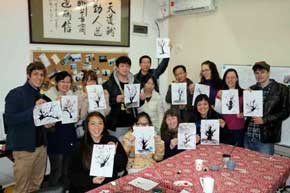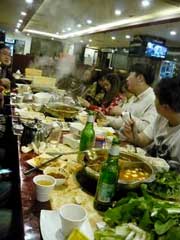
Describe your favorite must-have food that you tried abroad.
Ruth: Chinese food is amazing, and completely different of what we can taste outside China. I discovered a lot of new ingredients and recipes that I'm trying to repeat at home (unfortunately not achieving the same results), so I highly recommend that you should try absolutely everything.
But my favorites... probably all the amazing dishes with eggplant, sichuan style is a must, and taro, a versatile vegetable that can be fried like chicken, cooked with honey and caramel as a delightful dessert, or in milkshakes to die for. I didn't have the opportunity to try it, but there are a couple of restaurants in Yangshuo that offer dog, and you can buy some at the local market if you fancy it.
Describe your most meaningful souvenir and why you love it?
Ruth: I don't usually buy many souvenirs, I prefer to spend my money in experiences, food and longer trips, but I couldn't resist the temptation in China. Shoes, clothes, paintings, books, postcards... the list is quite long, thankfully I "destroyed" most of the clothes that I brought with me, so there was space in my luggage for my new treasures.
But there is one that I specially love, I went to a small stationary shop full of students and bought the same as them, a lovely brush and "reusable paper", instead of ink you write with water so you just need to wait until it is dry to use it again. Now learning Chinese is easier and remind me of great experiences.

Do you feel you got a chance to see the city from a local's perspective?
Ruth: One of the advantages of Omeida is that you share the academy with a lot of Chinese people studying English, which gives you the opportunity to enjoy the city from a completely different perspective.
As a white girl it was easy to spot me, but surrounded by locals I had the chance to understand and participate in the real Chinese way of life. From hire a bike, to have lunch with a local family, or walk through paths unknown in any map, everybody was willing to learn from me and let me learn from them, such a difference from a traditional touristic trip.
Did you run into a language barrier? Did you ever think you knew more/less of the language?
Ruth: Chinese is a difficult language, and Chinese people usually don't speak any of the languages that I master, therefore sometimes I felt a bit lost in translation. It was hard not being able to communicate, ask questions, interact with the people around you... studies says that communication is 5% verbal and 95% no-verbal, it didn't matter, even the simplest sign was a challenge.

However, I must have learned something, I remember going one time to the local market during my last week in Yangshuo and as soon as they realized that I speak some Chinese they started to ask me questions about my country, I was shocked when I was able to maintain some sort of conversation, I have never been more proud of myself.
Do you think your program changed you as a person?
Ruth: Every day, every experience, every person you meet, changes you, but I must admit that this adventure was a speed run. I couldn't be more happy about my decision of staying in China trying to get involve in their reality as much as possible.
I've learned a new language, understood a different culture, met incredible people, seen different landscapes, eaten exotic dishes... nothing would be the same, not even myself. The world is really big and beautiful in its diversity, but we tend to forget it living in our own and safe bubble, only getting out there we can appreciate its greatness, and this experience was exactly that for me.